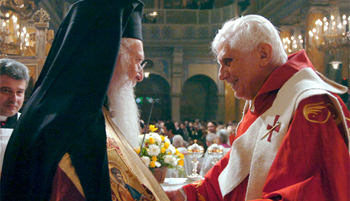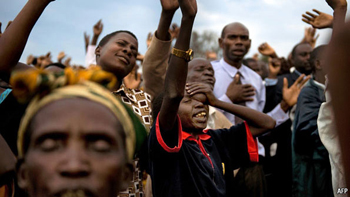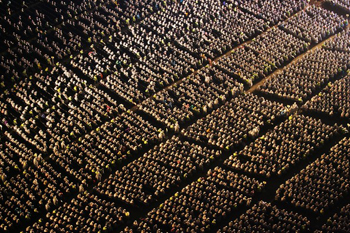Accept One Another
For Sunday October 6, 2013
World Communion Sunday
Lectionary Readings (Revised Common Lectionary, Year C)
Lamentations 1:1–6; 3:19–26 or Habakkuk 1:1–4, 2:1–4
Psalm 137 or Psalm 37:1–9
2 Timothy 1:1–14
Luke 17:5–10
Luke 17:5, "Lord, increase our faith!"
Thank God for Shadyside Presbyterian Church in Pittsburgh. Back in 1933, the saints there kick-started what eventually became World Communion Sunday — now celebrated the first Sunday in October. In a world of discord and distrust, and given the dismal track record of Christians in cooperation, World Communion Sunday is more important than ever.
The apostle Paul writes, "Accept one another, just as God has accepted you." (Romans 14:1, 15:7).
 |
Orthodox Ecumenical Patriarch Bartholomew and Pope Benedict XVI in 2006. |
This past summer I read a book by Jay Bakker called Faith, Doubt, and Other Lines I've Crossed Walking With the Unknown God (2013). It's a good book that's worth reading. If his name sounds familiar, you're not mistaken. "I will probably be eighty years old," writes Bakker, "and still introduced as Jay Bakker, son of Jim and Tammy Faye."
Bakker has covered his personal story in three previous books. His new book is one of theological reflection. He recently left as co-pastor of Revolution NYC to start a new church of the same name in Minneapolis. Revolution started in Phoenix in 1994 and has had subsequent iterations in Los Angeles, Atlanta, Charlotte, and NYC. Forget the stained glass; these churches meet in bars, bowling alleys, coffee shops, and candy stores.
 |
African Pentecostals. |
He calls his book a "chronicle of doubt" about several hot button issues, especially the very scary grace of God. In Rilke's famous phrase, he's doing what all mature believers must do; he's "living the questions."
What Bakker captures so well is how God's love subverts our many tribalisms and idols that demand sacrifices from us. Is such radically inclusive grace not dangerous? Yes, of course it is. But that's the call of the kingdom that Jesus announced.
Bakker wonders why Rick Warren refused his invitation to eat a meal with him — that richly symbolic act in Scripture whereby we accept, bless, and honor one another. Especially after Warren defended himself in 2012 after meeting with Muslim leaders, sharing a meal with them, traveling to Syria with them, and starting a ministry to end misunderstandings. And you refuse to eat with a fellow Christian?
"We ought to be becoming outcasts by befriending outcasts," he writes. "We should be ridiculed for hanging out with the ridiculous. We should be known for irrational grace. Irrational forgiveness."
 |
South Korean Christians celebrate Easter. |
And what are we saying and doing with such radical inclusion? We're saying, "This person's a real human being. A person, just like you and me." Of course, this is not what the church is known for. We're known for arguing who's in and who's out.
But Jesus says to each and every one of us, "Come on in." And surely we can say that to each other.
For World Communion Sunday I've also been thinking about Wendell Berry's poem from his book Leavings (2010):
Having written some pages in favor of Jesus,
I receive a solemn communication crediting me
with the possession of a "theology" by which
I acquire the strange dignity of being wrong
forever or forever right. Have I gauged exactly
enough the weights of sins? Have I found
too much of the Hereafter in the Here? Or
the other way around? Have I found too much
pleasure, too much beauty and goodness, in this
our unreturning world? O Lord, please forgive
any smidgen of such distinctions I may
have still in my mind. I meant to leave them
all behind a long time ago. If I'm a theologian
I am one to the extent I have learned to duck
when the small, haughty doctrines fly overhead,
dropping their loads of whitewash at random
on the faces of those who look toward Heaven.
Look down, look down, and save your soul
by honester dirt, that receives with a lordly
indifference this off-fall of the air. Christmas
night and Easter morning are this soil's only laws.
The depth and volume of the waters of baptism,
the true taxonomy of sins, the field marks
of those most surely saved, God's own only true
interpretation of the Scripture: these would be
causes of eternal amusement, could we forget
how we have hated one another, how vilified
and hurt and killed one another, bloodying
the world, by means of such questions, wrongly
asked, never to be rightly answered, but asked and
wrongly answered, hour after hour, day after day,
year after year — such is my belief — in Hell.
Similarly, in response to a letter from his brother, he writes in his book New Collected Poems (2012):
Dear John, You said, “Treat your worst enemies
as if they could become your best friends.”
You were not the first to perpetrate
such an outrage, but you were right.
Try as we might, we cannot
unspring that trap. We can either
befriend our enemies or we can die
with them, in the absolute triumph
of the absolute horror constructed
by us to save us from them.
Tough, but “All right,” our Mary said,
“we’ll be nice to the sons of bitches.”
 |
Chinese house church. |
So for World Communion Sunday I'm meditating on Paul: "Accept one another." I'm thinking about Jay Bakker trading bitter tribalisms for radical inclusion. And following the farmer-poet Wendell Berry: Christmas night and Easter morning are more than enough. "That seems a fair amount to believe," Garry Wills once observed.
"Lord, increase our faith!"
For further reflection,
Why not bless another person this week with this Celtic prayer. Just click on "mail this."
Originally from the Carmina Gadelica III, 207
Taken from Esther de Waal, editor, The Celtic Vision (Liguori, MO: Liguori/Triumph, 1988, 2001), p. 166
The love and affection of the angels be to you,
The love and affection of the saints be to you,
The love and affection of heaven be to you,
To guard you and to cherish you.
Image credits: (1) The Catholic World Report; (2) Duncan Green: From Poverty to Power blog; (3) Zimbio.com; and (4) Voice of the Persecuted





